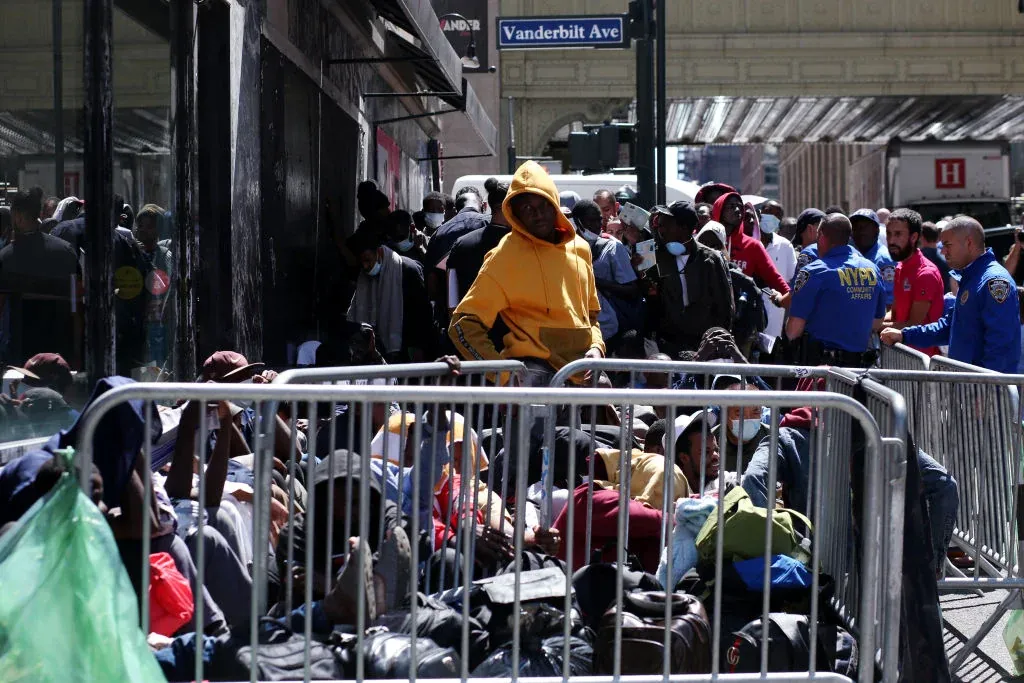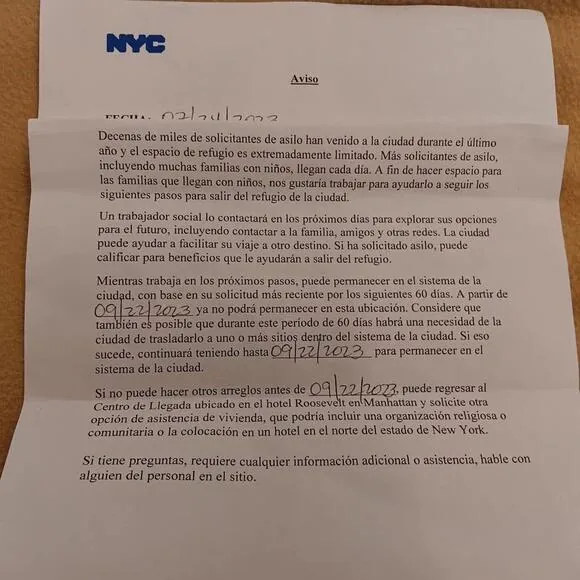The Adams administration in New York City has taken a measure to control the increasing number of homeless people by asking some migrants residing in the emergency homeless shelters to vacate the place as early as this weekend.
From the end of July, more than 10,800 adult migrants who are staying in emergency shelters have been informed by city officials that they have 60 days to either find a new place to stay or reapply for another bed at the city’s migrant intake center located at the Roosevelt Hotel in Midtown. This move aims to provide better assistance and resources to migrants while also ensuring that emergency shelters can continue to provide services to those who need them most. As the city works towards a more comprehensive and sustainable solution to support migrants, this 60-day notification period serves as a crucial step towards achieving that goal.
City Hall spokesperson Kayla Mamalek stated that the number of migrants who will reapply for shelter is expected to be minimal. This is because the city’s caseworkers have been actively assisting those who have received notices in transitioning out of shelters and locating alternative places to stay.
As the deadline nears, migrants who spoke to Gothamist have shared their feelings of fear and uncertainty.
Sid Ahmed Kerkoub, a Mauritanian resident at an Upper Manhattan shelter, expressed his concerns about his situation. He has been in the shelter for two months now with no job or work prospects. The paper he was given has only added to his worries.
Kerkoub emphasized that he has no desire to be homeless and living on the streets. He acknowledged that he only has 50 days left to secure new housing.
According to Kerkoub, he would opt to secure a job and rent a place of his own if possible. However, in the event that he is unable to do so, he plans to revisit the Roosevelt Hotel and apply for another accommodation arrangement.
Mohammed, a 28-year-old migrant from Mauritania, expressed his shock upon receiving a notice that he has to leave his Brooklyn shelter soon.
Mohammed, who preferred not to reveal his last name for fear of jeopardizing his immigration case, expressed his distress at the lack of options available to him and others in a similar situation. “We have nowhere to go, particularly those who do not have family members outside of New York,” he stated.
According to activist Power Malu, who has been helping newcomers for a year now, a notice letter was shared with Gothamist. The letter, written in Spanish, states that “You can no longer stay in this location” effective September 22, 2023. The recipient of the letter was a migrant who was staying at an emergency shelter in the Candler Building located in Midtown.
According to City Hall, migrants staying in shelters are required to leave by Saturday, September 23, at the earliest.
Last month, officials from the Adams administration testified at a City Council investigation that the objective of the policy is to decrease the increasing shelter population and create more room for the hundreds of new migrants arriving every day. However, they did not provide assurances that those who reapply for shelter would be given beds. The policy’s aim is to limit shelter stays to 60 days, as per reports.
According to sources, the possibility of additional migrants sleeping outside the Roosevelt Hotel cannot be completely ruled out. In fact, during some days this summer, nearly 200 individuals were captured on viral videos and featured in both national and international news reports, as they sought shelter outside the hotel. It is worth noting that this situation is constantly evolving, and officials will undoubtedly continue to monitor the situation closely.
Mamalek expressed his utmost pride in the effectiveness of our improved casework services and conveyed his belief that it will continue to benefit adult asylum-seekers who have received 60-day notices. However, he asserted that New York City has reached its limit, and we cannot carry the burden alone.
Mamalek expressed concern over the lack of support from state and federal partners. Without meaningful help, more difficult decisions will need to be made. Mamalek fears that this could result in heartbreaking situations, similar to the one witnessed outside the Roosevelt Hotel this past summer.
According to Mamalek, she was not able to disclose the exact number of migrants who have been given bus or plane tickets for relocation.
There is growing concern among local elected officials and advocates for immigration and housing that the shelter stay limits may contribute to a rise in street homelessness. These individuals worry that without access to stable shelter, vulnerable populations may be forced to live on the streets, further exacerbating an already concerning issue.
According to Malu and Adama Bah, who have been assisting newcomers in finding alternative accommodations for over a year now, an increasing number of migrants are resorting to sleeping on the streets, particularly in train stations, as they do not feel secure staying in city shelters.
Malu and Bah have reported that numerous migrants have been moved from one location to another, even before the 60-day deadline, leading to a state of chaos and uncertainty.
The mayor’s office has been referring to temporary congregate “respite centers” where newcomers are placed. These individuals are then often moved to tent cities that are established on soccer fields located on Randall’s Island and on a parking lot within the Creedmoor Psychiatric Center grounds in Queens.
According to Malu, who is the director and founder of Artists Athletes Activists, a nonprofit organization that works towards migrant advocacy, the individuals seeking work have no concrete plans. They are left with no option but to continue their job search and think of ways to support themselves and their families. This constant struggle is taking a toll on their mental health, as they are worried about ending up on the streets again. “Their mental well-being is getting affected as they try to find employment and simultaneously deal with the fear of homelessness,” Malu added.
In his statement, he expressed his opinion saying, “You’re only causing unnecessary suffering.”
According to Bah, it’s important to provide migrants with a timeline of at least a year. This is because they are required to apply for asylum within a year of their arrival in the United States. As the founder of Afrikana, an advocacy group that offers support to local migrants, Bah works tirelessly to assist those who may face racial profiling and harassment.
According to Malu, it has been a year since the initial chartered migrant buses arrived in the city, and unfortunately, the migrants remain in a state of limbo.
Read More:
- E-bikes might be ticketed and impounded in Huntington Beach
- A man from Dothan has been charged with human trafficking




